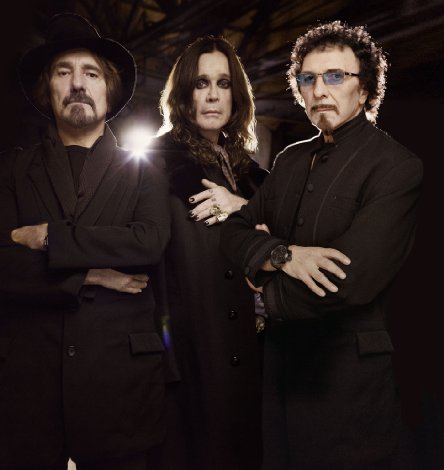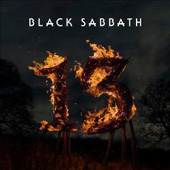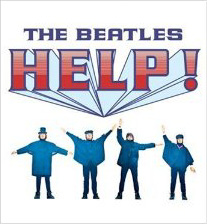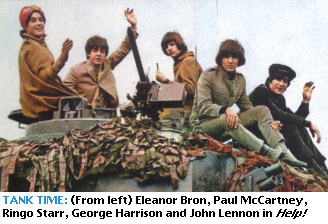![]()
| Sabbath's Lucky 13 |
|
![]()
Black Sabbath returns after 35 years with their trademark heavy guitar riffs and Ozzy Osbourne vocals.
Black Sabbath
13
ROCK (Vertigo/Universal)
By Kyle Anderson in Entertainment Weekly

![]() o far, the big sell on 13 is that it's the first Ozzy-fronted Sabbath album since 1978's Never Say Die! But the record's real MVP may be the guy who's not actually in the band at all: superproducer Rick Rubin.
o far, the big sell on 13 is that it's the first Ozzy-fronted Sabbath album since 1978's Never Say Die! But the record's real MVP may be the guy who's not actually in the band at all: superproducer Rick Rubin.
Rubin is known, in part, for reigniting the careers of established stars from Johnny Cash to Jay-Z, and his presence cuts two ways. Without him, it's likely this reconstituted lineup (minus drummer BIll Ward, due to a contract dispute) would have stuck to the formula that has made them notorious for more than four decades: Osbourne's volcanic wail, carried along on molten streams of heavy guitar magma. Instead, Rubin takes them back to their pre-"Iron Man" roots, encouraging them to indulge their love of pure blues and Cream-style psychedelia. The result is surprisingly adventurous, considering the monochrome palette of Osbourne's latter-day solo work. There's plenty of sludge -- especially on the morphing hell beast that is "End of the Beginning" -- and some excellent weirdness (see: the acoustic head trip "Zeitgeist"). Still, Rubin makes too much here feel dry and disappointingly small, and the flat, mookish thudding of Ward's replacement, Rage Against the Machine's Brad Wilk, doesn't help. At their best, the devil-horn-worthy numbers come across like pretty good Queens of the Stone Age songs. But you know who make great Queens of the Stone Age songs? Queens of the Stone Age. And their new album, ...Like Clockwork, stands as a far better tribute to Sabbath's legacy than what Rubin creates with the real thing. B-

|
By Will Hermes in Rolling Stone
"We decided to write horror music" is how Ozzy Osbourne describes Black Sabbath's birth in the great new heavy-metal oral history, Louder Than Hell. And that's exactly what they're doing, once again, on 13, -- a reunion set with three-quarters of the original band -- that revisits, and to an extent recaptures, the crushing, awesomely doomy spectacle of their first few records.
Needless to say, this is kind of a big deal. It's impossible to imagine heavymetal without Sabbath's groundwork. And Osbourne hasn't made a studio record with the band he founded for 35 years, not since he was ousted for being an unreliable alcoholic drug casualty after 1978's Never Say Die! Moreover, this reunion comes at a time when the evil germ of the evil gene of thir sound is deepy resonant: See Southern heavyweights Mastodon and Baroness; experimental acts like Liturgy and Boris; and hundreds of other bands around the world that owe a debt to the godfathers of gloom.
13 is steered by superproducer/superfan Rick Rubin, and it shows that, for all their innovations, Sabbath were a product of their era -- at core, they're a blues-rooted prog-rock band, and 13 may surprise some people in its proto-metal traditionalism. The eight-minute opener, "End of the Beginning," goes through various time shifts, beginning with a sludgy stomp, switching to a galloping midsection and ending with a floaty, almost Beatlesque outro. "Zeitgeist" recalls "Planet Caravan," from 1970's Paranoid, with shimmering acoustic guitars and gentle-Druid hand drums set against restrained jazzbo soloing by Toni Iommi, the man who revolutionized hard-rock guitar with his downtuned tritone riffing. After some reverse-recorded psychedelic spirals, "Damaged Soul" goes from molten blues to a hot boogie jam powered by Osbourne's harp; it's not far from Cream or Hendrix.
Philosophically, of course, 13 is more monstrous, at times comically so. "Down among the dead men's visoin/Faded dreams and nuclear fission," Osbourne whines on "Zeitgeist" in a voice as piercingly unpretty as it was back in the day; on the single "God Is Dead?" he rhymes "gloom," "doom" and "tomb" -- metal's unholy poetic trifecta. Osbourne is the main wild card here. In the early Aughts, his drug-addled dark-lord persona evolved into reality-TV caricature. Yet he takes to his task here with full aesthetic sobriety, as if conscious of his responsibility to teenagers facing existential terrors for the first time.
The other wild card is drummer Brad Wilk, formerly of Rage Against the Machine, filling in for original drummer Bill Ward, whose disagreements with his former bandmates have sadly reached a point where he's even been cropped out of photos on blacksabbath.com. Wilk doesn't have Ward's subtle swing. But he's a powerhouse, and his head-cracking style gives 13 a more modern feel. Above all, this reboot shows that the genre Sabbath helped birth remains timeless, insofar as the devil remains gainfully employed on Earth, and heavyweight rock shredding still kicks ass. * * * 1/2 ![]()

| Help! Is on Its Way |
|
![]()
The Beatles' second big-screen lark, which was a much weirder day's night, comes to Blu-ray
by Chris Nashawaty in Entertainment Weekly


![]() t's difficult to overestimate just how much the Beatles accomplished in very little time. The band released their first LP in 1963, and in only two years they had made five more, starred in two popular films, and taken over the entire world. By 1965, John, Paul, George, and Ringo were a more famous foursome than the Gospels, even if they weren't quite bigger than Jesus. Help! (1965, 1 hr., 32 mins., G) -- the Fab Four and director Richard Lester's madcap follow-up to A Hard Day's Night that's now available on Blu-ray -- catches the Liverpudlians right at the crossroads of their early moptopped superstardom and their later psychedelically influenced musical reinvention. Appropriately, the move itself recalls both the loose-limbed goofiness of their previous film and the colorful surrealism of Yellow Submarine, resulting in an absurd, infectious, and frolicsome romp that seems to be making itself up as it goes along. The plot concerns an evil cult's attempts to sacrifice Ringo after he gets a mystical ring stuck on his finger, but really that's only an excuse to string together a series of freewheeling scenes of exquisite nonsense that fuses the British anarchisms of Ealing comedies, Lindsay Anderson, and Benny Hill. The Beatles admitted that they had filmed much of itin a fog of marijuana smoke, and Lester smartly manages to tune the movie to their wavelength rather than vice-versa, a tactic he discusses in a new 30-minute documentary included in the extras. As a film, Help! is a bit of a crazy train to nowhere, but it's worth having a ticket to ride. A-
t's difficult to overestimate just how much the Beatles accomplished in very little time. The band released their first LP in 1963, and in only two years they had made five more, starred in two popular films, and taken over the entire world. By 1965, John, Paul, George, and Ringo were a more famous foursome than the Gospels, even if they weren't quite bigger than Jesus. Help! (1965, 1 hr., 32 mins., G) -- the Fab Four and director Richard Lester's madcap follow-up to A Hard Day's Night that's now available on Blu-ray -- catches the Liverpudlians right at the crossroads of their early moptopped superstardom and their later psychedelically influenced musical reinvention. Appropriately, the move itself recalls both the loose-limbed goofiness of their previous film and the colorful surrealism of Yellow Submarine, resulting in an absurd, infectious, and frolicsome romp that seems to be making itself up as it goes along. The plot concerns an evil cult's attempts to sacrifice Ringo after he gets a mystical ring stuck on his finger, but really that's only an excuse to string together a series of freewheeling scenes of exquisite nonsense that fuses the British anarchisms of Ealing comedies, Lindsay Anderson, and Benny Hill. The Beatles admitted that they had filmed much of itin a fog of marijuana smoke, and Lester smartly manages to tune the movie to their wavelength rather than vice-versa, a tactic he discusses in a new 30-minute documentary included in the extras. As a film, Help! is a bit of a crazy train to nowhere, but it's worth having a ticket to ride. A- ![]()
![]() Reader's Comments
Reader's Comments
No comments so far, be the first to comment.
